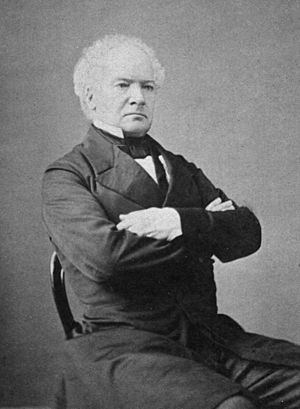James Ranald Martin facts for kids
Sir James Ranald Martin was a British military surgeon who lived from 1796 to 1874. He worked in Colonial India for the Honourable East India Company. He was very important for showing how cutting down forests (called deforestation) affected people's health. He helped people understand the connection between human health and the environment.
Contents
Early Life and Education
James Ranald Martin was born in 1796 on the Isle of Skye in Scotland. His family was one of the oldest on the island. He studied at St George's and Windmill Street School. In 1817, he joined the Bengal Medical Service as an assistant-surgeon. His uncle, Sir John Macdonald, who was a high-ranking army officer, helped him get this position.
Work in India
Martin arrived in India by ship in June 1817. He started his duties in Calcutta (now Kolkata) in December 1817.
Early Medical Observations
In 1818, he worked with British Army regiments in Fort William, Calcutta. Here, he saw the terrible effects of cholera, a serious disease. He was then sent to Orissa, where a bad fever had killed many people.
Military Service and Health Mapping
During the 1820s, Martin took part in several military battles. The most famous was the First Burmese War from 1823 to 1826. He noticed that diseases affected local people and Europeans differently. This made him think that mapping the health features of an area was as important as mapping its land. He believed this was key for military and economic growth.
His notes on the "medical topography" of Calcutta were groundbreaking. Medical topography meant studying how the climate, land, and environment affected public health. This led to many studies linking climate, public health, and development.
Promoting Public Health
In 1843, Martin became the President of the East India Company's medical board. He also updated a well-known book about diseases in hot climates. In 1863, he helped write a report for the Sanitary Commission, which focused on public health.
Martin was a strong supporter of preventive medicine. This means stopping diseases before they start. Smallpox vaccinations had begun in India before he arrived. But Martin was the first to strongly push for widespread prevention.
In 1835, he suggested that Company doctors should collect health information from different places. This data could then be studied. In 1836, he wrote an important report about the need for clean water in Calcutta. He also called for many more medical-topographical reports across India.
Forests and Health
During the Burma War, many of Martin's colleagues wrote reports about the health conditions of different regions. In the years that followed, other doctors also started writing detailed medical surveys of their towns or districts.
Many of these reports talked about how fast forests were being cut down since the early 1820s. These reports were very important. They helped lead to the creation of Forest Departments and the Indian Forest Service in British India. These groups worked to protect forests.
 | Jewel Prestage |
 | Ella Baker |
 | Fannie Lou Hamer |


